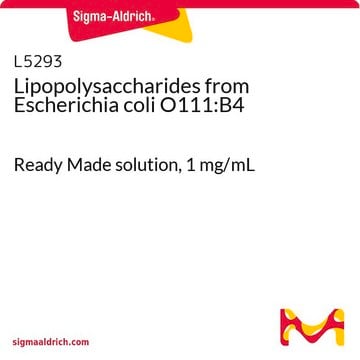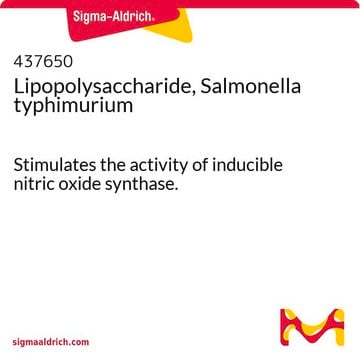SMB00610
Lipopolysaccharide from Porphyromonas gingivalis
purified by phenol extraction
Synonyme(s) :
LPS
About This Item
Produits recommandés
Source biologique
Porphyromonas gingivalis
Niveau de qualité
Forme
powder
Produit purifié par
phenol extraction
Impuretés
≤3% Protein (Lowry)
Couleur
white to faint yellow
Solubilité
triethylene glycol dimethyl ether: 0.90-1.10 mg/mL to hazy, colorless to light yellow
Conditions d'expédition
ambient
Température de stockage
2-8°C
Description générale
Application
- as a treatment to stimulate acute lung injury in human bronchial epithelial (HBE) cells
- as an agonist for toll-like receptor 4 (TLR4) and to stimulate intestinal normal fibroblasts (NFs) to study osteopontin (OPN) expression in myofibroblasts
- to study its effects on pro-inflammatory and pro-coagulant genes expression in endothelial cells
Actions biochimiques/physiologiques
Additionally, it was demonstrated that the mechanisms by which LPS from E. coli and P. gingivalis modulate cluster of differentiation 14 (CD14), toll-like receptor 2 (TLR2), and toll-like receptor 4 (TLR4) surface expression, primary and secondary cytokine responses are different.
Porphyromonas gingivalis is a Gram-negative bacterium that is known to be involved in adult periodontitis. Periodontitis is a chronic inflammatory disease characterized by the recession of the supportive tissue surrounding teeth. Studies have shown that the LPS from P. gingivalis plays an important role in this disease.
A recent study demonstrated that LPS from P. gingivalis stimulates insulin secretion by the pancreatic β cell line, MIN6. In the presence of 5 mM glucose and 50-500 ng/mL LPS from P. gingivalis, a significant induction of insulin secretion was observed.
Notes préparatoires
Autres remarques
Code de la classe de stockage
11 - Combustible Solids
Classe de danger pour l'eau (WGK)
WGK 3
Point d'éclair (°F)
Not applicable
Point d'éclair (°C)
Not applicable
Certificats d'analyse (COA)
Recherchez un Certificats d'analyse (COA) en saisissant le numéro de lot du produit. Les numéros de lot figurent sur l'étiquette du produit après les mots "Lot" ou "Batch".
Déjà en possession de ce produit ?
Retrouvez la documentation relative aux produits que vous avez récemment achetés dans la Bibliothèque de documents.
Les clients ont également consulté
Notre équipe de scientifiques dispose d'une expérience dans tous les secteurs de la recherche, notamment en sciences de la vie, science des matériaux, synthèse chimique, chromatographie, analyse et dans de nombreux autres domaines..
Contacter notre Service technique



